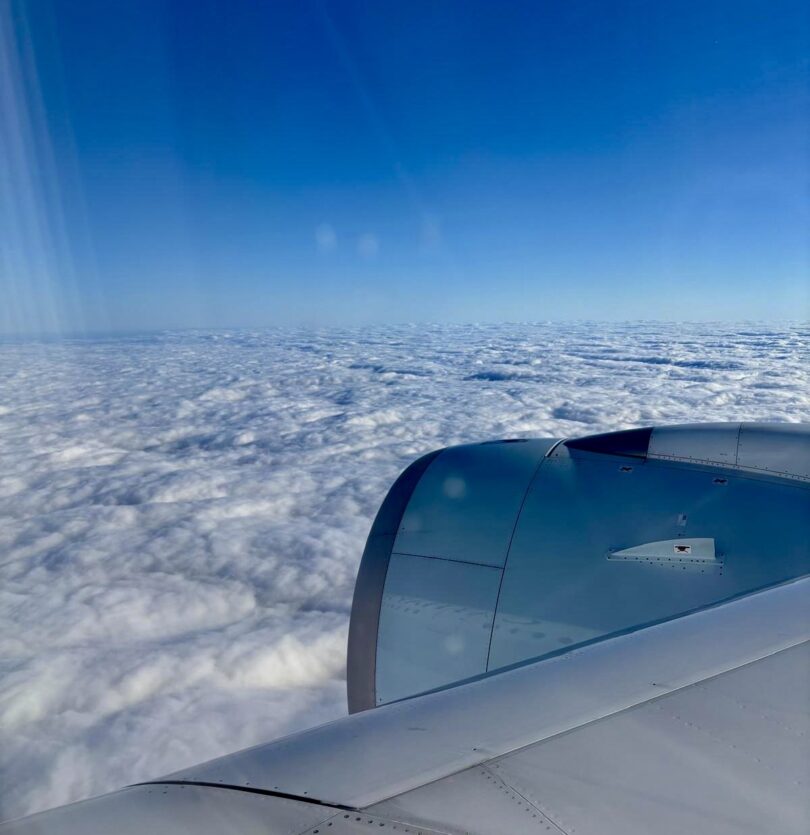When I travel, I write. Away from home and grey routine, I come alive and trust myself. My world awakens and expands. I feel compelled to capture it.
I have recently returned from a five-week overseas trip. Along the way, I wrote as I went: swift little sketches that sought to reveal the meaning or the majesty of individual moments; figurative postcards of gratitude and joy.
A selection of those entries, first published to social media, is posted below.
I used to think that travel is a form of heightened reality. Now, I’m not so sure. Is travel, in fact, our most authentic state? Do our lives at home need elevating to a context and an outlook as bright and boundless as the open road?
That’s my new adventure: finding ways to keep alive the spirit of the journey.
Life as travel. At home and away.
Paul Bateman
July 2025

16 May, Melbourne, Australia
To another hemisphere
Via the Kingdom of Clouds
19 May, Lancashire, England
 This is my eighth visit to the farm in Lancashire, England, where Shirley was born and raised.
This is my eighth visit to the farm in Lancashire, England, where Shirley was born and raised.
Shirley is a product of this green and pleasant land; I see reflected in her nature, the beauty and tranquillity of the surrounding fields and villages.
Each visit here begins the same way. We slip our feet into dusty, old boots and drag our weary, jet-lagged bones into the open air.
There is a dirt road, on the far side of a single train track, which leads to a narrow canal. We follow a path, beside the canal, to a pub made of timber and stone. Our first slow pint of English ale is a joy beyond description.
Later, on the walk back home, the deepest breath escapes my lungs. I start to find my rhythm.
And so, at last, in soft warm light, we arrive at the present moment.
20 May, Crosby, England
On a vast stretch of beach, to the north of Liverpool, a silent, weathered figure stands motionless, staring out to sea.
To the left and right, on the sand and in the water, similar figures are caught in the mud, submerged by waves or rusting in the sun. The effect is mesmerising.
Another Place is an artwork by British sculptor Sir Antony Gormley featuring 100 cast-iron, life-size figures spread along three kilometres of foreshore and almost one kilometre into the Irish Sea.
The figures, each weighing 650 kilos, are made from casts of the artist’s own body: they stand on Crosby Beach, looking out to sea, staring intently at the glistening horizon.
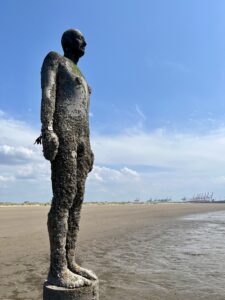 Contractors spent three weeks lifting the figures into place and driving them into the beach on metre-high foundation piles, when the figures were first installed in 2005.
Contractors spent three weeks lifting the figures into place and driving them into the beach on metre-high foundation piles, when the figures were first installed in 2005.
According to the artist, Another Place harnesses the ebb and flow of the tide to explore humanity’s relationship with nature.
This almighty installation “exposes to light and time the nakedness of a particular and peculiar body. It is no hero, no ideal, just the industrially reproduced body of a middle-aged man trying to remain standing and trying to breathe, facing a horizon busy with ships moving materials and manufactured things around the planet.”
Sure enough, throughout the day, giant shipping containers glide like swans across the sea, to and from the Liverpool docks, via the Mersey River.
Some of the figures are stained with bird shit or covered in barnacles. All are scarred by time and tides.
Shirley and I walk among them, stand beside them and join with them in gazing at the sea and sky.
Inevitably, we project our own feelings on the figures that we each encounter: that is the genius of this art. Loneliness, grief, stoicism, kinship – anything is possible.
Out at sea, the incoming tide engulfs one of the figures; it disappears, bit-by-bit, beneath the rising waters.
I cannot look away.
22 May, Manchester, England
Training begins when the team is called to gather in the golden light of a small, rectangular field.
Players jog to a spot on the wing and assemble in a semi-circle. An able young man stands before them and speaks for a bit, with confident ease. His authority is obvious; when the young man talks, his teammates listen.
The team is sent on a warm-up lap. They jog along the boundary line, talking ceaselessly as they go, four or five footballs flying between them.
Approaching the posts under which I stand, a handful of players emerge from the pack and take running shots at goal. Footballs fly like shooting stars in the vacant sky above me.
I am a man from Melbourne, Australia, at the Burnage Rugby Football Club, in a suburb south of Manchester.
 Here on a field, far from the club rooms, the Manchester Mosquitoes Australian Rules football club is granted a small green pitch on which to hold a training session, every Thursday evening.
Here on a field, far from the club rooms, the Manchester Mosquitoes Australian Rules football club is granted a small green pitch on which to hold a training session, every Thursday evening.
For the next 90 minutes, 20-plus players will bring the ground to life with short, sharp bursts of effort and noise: handball practice, kicking drills, stoppage work and tackling.
I will drift to the sound of exuberant voices and the pleasing thump of footballs.
The Manchester ‘Mozzies’ are one of four Australian Rules teams in the AFL Wales & England League, a modified, 9-a-side competition that also includes teams from Cardiff, Nottingham and Oxford.
The club fields a men’s and women’s team – though for now, to ensure the numbers, the women are compelled to partner on game day with the Oxford women’s team.
In the nation’s capital, the larger and better-resourced AFL London league attracts hundreds of members to its 18-a-side competition.
The broader UK league took a huge hit in the wake of the COVID-19 pandemic. Whole seasons were suspended. Entire teams fell apart. Even today, players come and go with the frequency of seasonal farmhand workers.
The Mozzies lost three Irishmen last year, when the trio departed after a brief but brilliant stint with the club.
“We miss their pace,” says a current player, mournfully.
Games are played from April to August on any available field, typically on a rugby pitch.
Temporary point posts are placed on either side of the rugby posts to create the four-post configuration that defines Australian Rules football.
As best they can, players ignore the crossbar that dissects the upright rugby posts and adapt their style of play to smaller, rectangular grounds.
Australian expats and travellers make up more than half of the players on each Mozzies team – but anyone, from anywhere, can learn the game and join the club.
The captain of the Mozzies men’s team is a Manchester lad, known by the nickname ‘Libba’.
Why that name? Because once, when he wore a Bulldogs AFL football jumper, a teammate compared him favourably to Western Bulldogs Premiership player Tom ‘Libba’ Liberatore, and the name stuck.
Such is the Australian way.
Libba lived in Australia, a few years ago, where he learned to play the local game. Back home, he wandered down to training one night and found himself a place on the Mozzies team.
When I suggest to one of his Australian teammates that Libba’s achievement is remarkable – an Australian Rules football team led by an Englishman – the teammate replies without hesitation: “Libba’s good.”
Among the Australians that I meet at training are men and women from Brisbane, Perth and Melbourne. When I say hello, and they hear my accent, everyone is keen for a chat.
The men are laconic, friendly and direct. The women are authentic, down-to-earth and bright. I like them all.
Some play Aussie Rules in England because they love the competition or want to keep fit. Many are travellers, far from home, who play for companionship.
I have followed the team on social media for years. There may come a day when I live in this country, in a town not far from Manchester, where my wife was born. If that ever happens, you’ll find me here, hugging a Sherrin on a Thursday night.
I want this evening to last forever, but I have a train to catch.
The Mozzies are spread from end to end, running at pace through the midfield, moving the football with fluid force. A leading forward breaks to his left and charges into open space, pointing at the northern sky.
This entry published also on The Footy Almanac.
3 June, Sardinia, Italy
When our bus failed to arrive, a man and a woman from Turin, Italy, stepped forward to assist. They studied the timetable, spoke with some locals in Italian, and convinced us eventually to abandon our plans.
Without notice or fuss, the couple purchased bus tickets on our behalf and declined any offer to reimburse them. Instead of heading east, we joined them on a bus that bounced along remote, rough roads to the west of Maddelena, an island off the island of beautiful Sardina.
We parted on a beach, surrounded by blue and pristine water, coastal rocks and scrub. We assumed this destination would include a beachside restaurant; we were wrong. We were miles from anywhere, without food or water. The heat was intense.
In the distance was a campervan. We made our way towards it. A young woman appeared from the van to offer us, without hesitation, a giant bottle of water. We tried to thank her, but she instead apologised that the water wasn’t chilled.
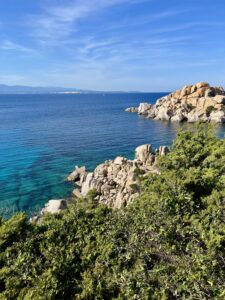 We swam at the beach and lay in the sun, on a stretch of pure sand. When it was time to leave, we retraced our steps to a wooden post by a weathered fence at the edge of a narrow road. There we waited wearily for a bus that never came. We tried to call an Uber, but there were none to be found.
We swam at the beach and lay in the sun, on a stretch of pure sand. When it was time to leave, we retraced our steps to a wooden post by a weathered fence at the edge of a narrow road. There we waited wearily for a bus that never came. We tried to call an Uber, but there were none to be found.
A man and a woman emerged from the heat and strolled towards us, casually. They were two young Americans, travelling the world on very little money but a ton of optimism. It took some time before they spoke. When they did, I could barely believe the stories they told about the spirited path that led them to this moment.
They managed to call a taxi – and we agreed to split the fare – but when we reached the port where our ferry was waiting, they offered back our money.
Two strangers at a bus stop. One woman in a van. Two young kids on a lonely road. Everywhere we went that day, we found people to be good.
I sat with Shirley, in a bar at sunset, recalling every detail of our extraordinary day. We were buzzing with excitement, grateful for the journey and the strange, bright magic of the road.
6 June, Sardinia, Italy
There are three of us on this holiday: Shirley, me and Jude.
 Jude is the spirit that floats between us, casting a shadow wherever we go.
Jude is the spirit that floats between us, casting a shadow wherever we go.
Jude was our companion for almost 16 years: a little black kitten that grew to be the most extraordinary black cat.
Here’s a story I wrote about Jude, several years ago.
Jude was diagnosed with a Stage 4 kidney disease, not long before we departed Australia. There are only four stages to the disease; the fourth is the worst. Jude grew thin and listless. He was struggling; we could tell.
Our vet made a house call. I cradled Jude in my arms. Shirley stroked his head. We put our mouths to his ear and thanked him for the love. His body grew heavy, his breathing faint. Soon after that, Jude passed away.
I am writing these words in Sardinia, a long way from Australia. I have seen the sun lay its warmth in doorways and on balconies throughout this island paradise. It makes me think of Jude: how he always found a place in the sun and bathed himself in radiant light.
The pain of Jude’s absence awaits us, back home. For now, he travels with us.
8 June, Sardinia, Italy
If wine is a window to people, place and culture, then I have thrown the shutters open and embraced Sardinia.
Vermentino is the portal through which I grasp this rugged island, through which I taste the sun and sea.
Light-bodied, straw-coloured, super-fresh and fragrant, Vermentino positively shimmers with bright, intense aromas of grapefruit, peach, lemon, lime and every sort of melon.
On the palate, the wine is dry and cleansing: think crushed rocks, sea spray, almond flakes and a lick of honey (in a fuller-style Vermentino).
I compare Vermentino, which is typically oak-free, to a good Italian Soave or a young Semillon from the Hunter Valley, Australia. Vermentino sits somewhere between them: the taste of summer in every glass.
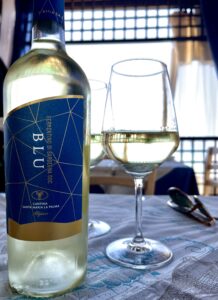 Each example of this classic Sardinian variety complements a thousand dishes, from grilled seafood to a slice of Pecorino cheese on a chunk of crusty bread.
Each example of this classic Sardinian variety complements a thousand dishes, from grilled seafood to a slice of Pecorino cheese on a chunk of crusty bread.
It is hard to think of another wine that so perfectly encapsulates the spirit of its native home.
I travelled once through the Basque Country of northern Spain, obsessed with wines from the Txakoli region; those wines are, perhaps, one example.
There, sea breezes reach the vineyards that cling to the coastline by the Bay of Biscay. This lends to the wines of Txakoli a distinctive saline note.
Surrounded each day by sea and sky, I craved those vibrant wines.
The same is true of Vermentino.
With almost 2,000 kilometres of coastline, Sardinia sits in the Mediterranean, bathed by light and enlivened by the sea. The air itself is succulent.
I have sat by the beach, after a swim, and washed the salt from my lips with a cold, crisp Vermentino.
I have sat in the shade of a quiet cafe, sipping Vermentino to escape the midday heat.
I have paired good Vermentino with chargrilled fish and squid.
In every restaurant, in every bar, someone’s drinking Vermentino.
Find yourself a bottle. Through the window lies Sardinia.
13 June, Regensburg, Germany
My train departed Regensburg earlier this morning, bound for Munich airport. Distinctive German houses slipped past my carriage window, followed by some weathered sheds near an empty railway yard.
Soon I was speeding over flat and open countryside, where the sun cast its light on tractors, fences, farms and barns.
Beyond that, the train entered a forest, surrounded on both sides by the strange, piercing beauty of tall, dark trees.
When at last the forest fell away, the train emerged into brilliant sunshine and swept towards the south.
I arrived at Munich airport, just before midday. I fly to England within the hour.
I love my German friends. We grew up together, a hemisphere apart: from teenage hitchhikers without a care to middle-aged adults, carrying all the usual burdens of time and circumstance.
Will I see my German friends again? I hope so, though I know the clock is running down and much depends on fate and chance.
Sunlight and shadows on every track.
16 June, Manchester, England
From the fair green fields of Lancashire, England, to the heat and restless energy of vibrant Hong Kong.
19 June, Hong Kong, China
The weather is hot and humid. The air itself seems wet. We walk the streets and hills of Hong Kong, drenched in sweat, breathing hard.
Low, dark clouds cover the island, obscuring tall buildings and many of the mountains that rise above the city.
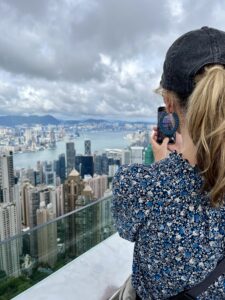 Lush, green vegetation bursts from the earth and fights for a place among towers of steel and concrete.
Lush, green vegetation bursts from the earth and fights for a place among towers of steel and concrete.
The fragrance of the tropics hangs heavy in the air, a pungent and exotic scent like nowhere else on earth.
The rain is formidable. It pounds the streets in stunning bursts of all-consuming noise. Water gushes from broken pipes and spills from sagging gutters.
We huddle in a doorway, beneath a flimsy canopy, astonished and immobilised by the power of it all.
In an instant, it is over. The sun appears in a blaze of heat and casts its glare in every street.
Puddles of water evaporate. Steam rises from the pavement. Pedestrians assert themselves.
Life, here, rushes on.
20 June, Hong Kong To Melbourne
Grateful for the journey
Happy to be heading home
Ready for what’s next



